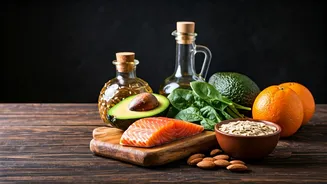Understanding HDL Cholesterol
HDL cholesterol plays a crucial role in maintaining heart health. It functions as a scavenger, collecting excess cholesterol from the arteries and transporting
it back to the liver, where it is processed and removed from the body. High levels of HDL cholesterol are generally associated with a reduced risk of heart disease, whereas low levels can increase this risk. Understanding the importance of HDL is the first step towards making informed dietary choices that support heart health. A healthy lifestyle that includes a balanced diet rich in specific nutrients can naturally elevate your HDL levels and protect your cardiovascular system.
Olive Oil's Heart Benefits
Extra virgin olive oil stands out as a cornerstone of the Mediterranean diet, renowned for its heart-healthy properties. It's rich in monounsaturated fats, which help to raise HDL cholesterol levels. These beneficial fats also assist in lowering LDL cholesterol, often referred to as 'bad' cholesterol, further enhancing heart health. Incorporating olive oil into your diet is simple, whether you use it for cooking, drizzling over salads, or dipping bread. Aim to use olive oil regularly to enjoy its protective effects and contribute to your overall well-being. Its antioxidants and anti-inflammatory properties also contribute to its health benefits, making it a versatile choice for a healthy lifestyle.
Avocados: Creamy Goodness
Avocados, with their creamy texture and mild flavor, are another excellent choice for boosting HDL cholesterol. Similar to olive oil, avocados are packed with monounsaturated fats that elevate HDL levels and help reduce harmful LDL cholesterol. They are also a source of fiber, which aids in digestion and promotes overall cardiovascular health. Enjoy avocados in various ways – from adding slices to your salads and sandwiches to creating guacamole. Their versatility makes them an easy and delicious addition to your diet, supporting heart health with every bite. Furthermore, avocados are rich in essential vitamins and minerals, providing additional health benefits.
Fatty Fish: Omega-3 Power
Fatty fish, such as salmon, mackerel, and sardines, are rich in omega-3 fatty acids, crucial for heart health. Omega-3s not only boost HDL cholesterol but also help reduce triglycerides, another type of fat in the blood, which can increase the risk of heart disease. Regularly consuming fatty fish can help prevent heart problems. Aim for at least two servings of fatty fish per week to experience the benefits of omega-3s. These fish are also a good source of protein, further enhancing their nutritional value. Considering grilling, baking, or poaching them to keep their nutritional profile intact.
Nuts and Seeds Benefits
Nuts and seeds are powerhouses of nutrition, offering a combination of healthy fats, fiber, and antioxidants. Almonds, walnuts, flaxseeds, and chia seeds, among others, can help raise HDL cholesterol levels. They also provide essential nutrients that support overall heart health. Incorporate a handful of nuts and seeds into your daily diet as a snack, add them to your breakfast cereal, or sprinkle them on salads. These additions provide a satisfying crunch and boost your intake of beneficial nutrients, contributing to better heart health. Remember to choose unsalted varieties to avoid excessive sodium intake.
Whole Grains: Fiber Boost
Whole grains, such as oats, brown rice, and quinoa, are rich in soluble fiber, which helps lower LDL cholesterol and can slightly increase HDL levels. Soluble fiber binds with cholesterol in the digestive system, preventing its absorption into the bloodstream. Switching to whole grains from refined grains can make a significant difference to your heart health. Choose whole-grain bread, pasta, and cereals, and integrate options like oatmeal into your breakfast routine. The sustained energy release from whole grains also contributes to overall health and well-being, making them an excellent dietary choice.
Berries: Antioxidant Power
Berries, including blueberries, strawberries, and raspberries, are packed with antioxidants and fiber, which support heart health. They can help improve HDL cholesterol levels and reduce inflammation. The antioxidants in berries protect against oxidative stress, which can damage blood vessels and increase the risk of heart disease. Enjoy a daily serving of berries in smoothies, salads, or as a standalone snack. Their vibrant color and delicious flavor make them a versatile addition to your diet, while their health benefits make them an essential part of any heart-healthy eating plan. Berries are also low in calories and high in vitamins.














